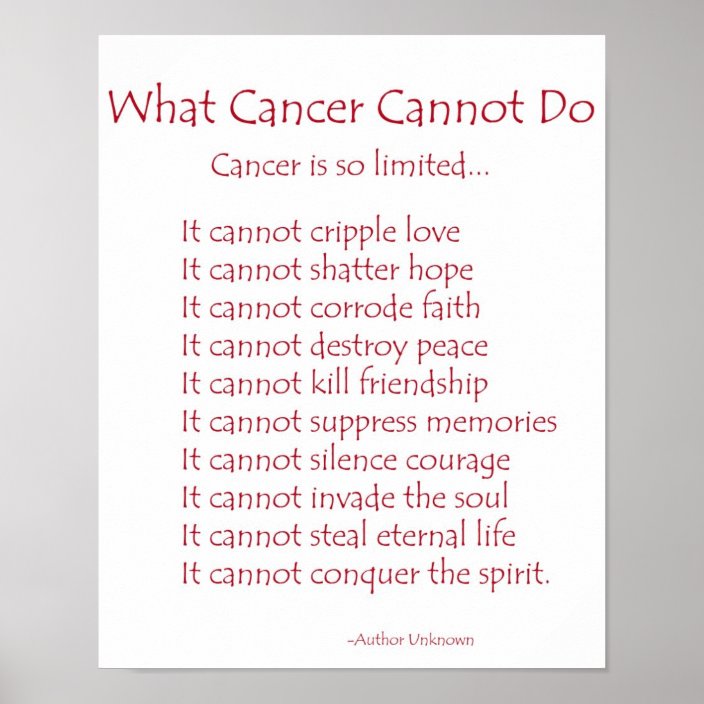
The Profound Resilience in "Poem About What Cancer Cannot Do": A Literary Exaltation
In the realm of literature, amidst the myriad expressions of human experience, there lies a poignant and profound work that confronts the formidable adversary of cancer with unwavering defiance: "Poem About What Cancer Cannot Do." This masterpiece, penned by an anonymous author, has captivated readers worldwide with its lyrical exploration of the indomitable spirit that transcends adversity.
The poem’s central theme revolves around the transformative power of perspective. Cancer, a diagnosis all too often synonymous with despair, is reframed through the prism of what it cannot conquer. Through vivid imagery and soulful introspection, the author unveils the enduring essence of the human spirit, which remains unyielding even in the face of physical affliction.
Suitable Writing Styles for "Poem About What Cancer Cannot Do"
The diverse range of emotions and themes encapsulated within "Poem About What Cancer Cannot Do" lend themselves to a variety of writing styles, each offering unique nuances and perspectives. Here are some suitable approaches:
- Lyric Poetry: A deeply personal and subjective form that focuses on expressing emotions and individual experiences.
- Narrative Poetry: A storytelling style that recounts a sequence of events involving characters and a plot.
- Haiku: A traditional Japanese form characterized by its brevity and evocative imagery, often capturing a fleeting moment or insight.
- Free Verse: A modern form that disregards traditional poetic structures and allows for greater freedom of expression.
Exploring the Poetic Tapestry of Resilience
Poem 1: A Symphony of Defiance
Cancer’s claws may etch my flesh,
But my spirit’s flight it cannot mesh.
With every stolen breath, I soar,
Above the darkness, forevermore.
Poem 2: The Dance of Light and Shadow
In shadows deep, where pain resides,
A flicker of resilience abides.
Cancer’s grip cannot dim its glow,
For my soul’s light burns brighter than woe.
Poem 3: The Unconquered Spirit
Through trials fierce, my resolve unfurls,
Cancer’s venom cannot quench my thirls.
My wounds may bear its cruel embrace,
But my spirit’s fire it cannot erase.
Crafting Your Own Poem About Cancer
For those moved by the transformative message of "Poem About What Cancer Cannot Do," here are some tips for creating your own poetic expression:
- Draw from Personal Experience: Share your own story or that of a loved one who has faced cancer.
- Focus on the Enduring Spirit: Emphasize the resilience and strength that transcends physical limitations.
- Employ Vivid Imagery: Use sensory details and metaphors to evoke a visceral response.
- Seek Consolation and Hope: Offer solace and inspiration to those facing similar challenges.
Engaging with Poetry
To appreciate the depth of any poem, including "Poem About What Cancer Cannot Do," consider these reading techniques:
- Read Aloud: Allow the words to resonate with your senses.
- Analyze the Language: Pay attention to the choice of words, imagery, and structure.
- Reflect on the Meaning: Consider the poem’s central message and how it resonates with your own experiences.
Frequently Asked Questions
- Who wrote "Poem About What Cancer Cannot Do"? The author remains anonymous.
- What is the purpose of the poem? To inspire hope and resilience in those affected by cancer.
- What are some examples of cancer-related poems? "The Courage That My Mother Had" by Edna St. Vincent Millay and "Cancer" by Erica Jong.
Closing Remarks
"Poem About What Cancer Cannot Do" serves as a testament to the indomitable human spirit. It reminds us that even in the face of adversity, there lies an unyielding force that triumphs over darkness. May this poem continue to inspire and uplift those who have been touched by cancer, reminding them that their strength extends far beyond the confines of their diagnosis.
A Plea for Authenticity
In the spirit of literary integrity, it is imperative to refrain from plagiarism. If you draw inspiration from an existing work, always give credit to the original author. Sharing and attributing credit fosters a collaborative and respectful literary culture.
Thank you for embracing the transformative power of poetry. May these words ignite a spark of hope and resilience within you and all who encounter them.
